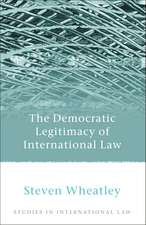Intervention in Civil Wars: Effectiveness, Legitimacy, and Human Rights: Studies in International Law
Autor Chiara Redaellien Limba Engleză Hardback – 24 feb 2021
| Toate formatele și edițiile | Preț | Express |
|---|---|---|
| Paperback (1) | 307.51 lei 43-57 zile | |
| Bloomsbury Publishing – 19 oct 2022 | 307.51 lei 43-57 zile | |
| Hardback (1) | 571.57 lei 43-57 zile | |
| Bloomsbury Publishing – 24 feb 2021 | 571.57 lei 43-57 zile |
Din seria Studies in International Law
- 34%
 Preț: 511.07 lei
Preț: 511.07 lei - 30%
 Preț: 538.77 lei
Preț: 538.77 lei - 23%
 Preț: 249.26 lei
Preț: 249.26 lei - 34%
 Preț: 512.30 lei
Preț: 512.30 lei - 21%
 Preț: 275.26 lei
Preț: 275.26 lei - 30%
 Preț: 570.51 lei
Preț: 570.51 lei - 30%
 Preț: 571.24 lei
Preț: 571.24 lei - 30%
 Preț: 598.45 lei
Preț: 598.45 lei - 18%
 Preț: 297.20 lei
Preț: 297.20 lei - 30%
 Preț: 573.05 lei
Preț: 573.05 lei - 30%
 Preț: 1138.79 lei
Preț: 1138.79 lei -
 Preț: 448.37 lei
Preț: 448.37 lei - 30%
 Preț: 571.34 lei
Preț: 571.34 lei - 28%
 Preț: 406.31 lei
Preț: 406.31 lei - 21%
 Preț: 270.97 lei
Preț: 270.97 lei - 30%
 Preț: 570.43 lei
Preț: 570.43 lei - 30%
 Preț: 836.82 lei
Preț: 836.82 lei - 14%
 Preț: 570.43 lei
Preț: 570.43 lei - 30%
 Preț: 512.37 lei
Preț: 512.37 lei - 30%
 Preț: 511.14 lei
Preț: 511.14 lei - 30%
 Preț: 954.11 lei
Preț: 954.11 lei - 30%
 Preț: 572.47 lei
Preț: 572.47 lei - 30%
 Preț: 603.73 lei
Preț: 603.73 lei - 30%
 Preț: 779.50 lei
Preț: 779.50 lei - 14%
 Preț: 837.54 lei
Preț: 837.54 lei - 30%
 Preț: 898.78 lei
Preț: 898.78 lei - 30%
 Preț: 576.40 lei
Preț: 576.40 lei - 30%
 Preț: 719.91 lei
Preț: 719.91 lei - 30%
 Preț: 599.66 lei
Preț: 599.66 lei - 12%
 Preț: 233.46 lei
Preț: 233.46 lei - 30%
 Preț: 779.50 lei
Preț: 779.50 lei - 30%
 Preț: 570.43 lei
Preț: 570.43 lei - 14%
 Preț: 779.09 lei
Preț: 779.09 lei - 30%
 Preț: 540.38 lei
Preț: 540.38 lei - 30%
 Preț: 573.86 lei
Preț: 573.86 lei - 14%
 Preț: 574.92 lei
Preț: 574.92 lei - 28%
 Preț: 500.25 lei
Preț: 500.25 lei - 30%
 Preț: 542.02 lei
Preț: 542.02 lei - 30%
 Preț: 778.12 lei
Preț: 778.12 lei - 30%
 Preț: 540.48 lei
Preț: 540.48 lei - 30%
 Preț: 570.43 lei
Preț: 570.43 lei - 30%
 Preț: 515.24 lei
Preț: 515.24 lei - 30%
 Preț: 573.70 lei
Preț: 573.70 lei - 30%
 Preț: 720.23 lei
Preț: 720.23 lei - 30%
 Preț: 784.00 lei
Preț: 784.00 lei - 22%
 Preț: 571.24 lei
Preț: 571.24 lei - 14%
 Preț: 779.09 lei
Preț: 779.09 lei - 30%
 Preț: 779.91 lei
Preț: 779.91 lei
Preț: 571.57 lei
Preț vechi: 817.57 lei
-30% Nou
Puncte Express: 857
Preț estimativ în valută:
109.38€ • 113.55$ • 91.21£
109.38€ • 113.55$ • 91.21£
Carte tipărită la comandă
Livrare economică 24 martie-07 aprilie
Preluare comenzi: 021 569.72.76
Specificații
ISBN-13: 9781509940547
ISBN-10: 1509940545
Pagini: 344
Dimensiuni: 156 x 234 x 27 mm
Greutate: 0.65 kg
Editura: Bloomsbury Publishing
Colecția Hart Publishing
Seria Studies in International Law
Locul publicării:London, United Kingdom
ISBN-10: 1509940545
Pagini: 344
Dimensiuni: 156 x 234 x 27 mm
Greutate: 0.65 kg
Editura: Bloomsbury Publishing
Colecția Hart Publishing
Seria Studies in International Law
Locul publicării:London, United Kingdom
Caracteristici
Offers a much needed examination of international law interventions in internal conflicts
Notă biografică
Chiara Redaelli is Visiting Research Fellow at Harvard Law School and Research Fellow at the Geneva Academy of International Humanitarian Law and Human Rights.
Cuprins
PART ISOVEREIGNTY, INTERVENTION, AND HUMAN RIGHTS: THE EVOLUTION OF A CLOSE RELATIONSHIP1. Interventions in Internal Conflicts in the Pre-Charter Era I. The Use of Force as Crucial Prerogative of State Sovereignty: From Bellum Justum Doctrines to the Right to War A. Just War Doctrines B. The Right to Wage War II. The Emergence of the Principle of Non-intervention as Fundamental Rule Protecting Sovereignty III. Interventions in Internal Conflicts before the General Ban on the Use of Force IV. Concluding Observations 2. Intervention and Use of Force in the United Nations Era I. Interventions in Internal Conflicts II. The Ban on the Use of Force III. Non-intervention, Sovereignty, and Human Rights IV. Concluding Observations PART IIINTERVENTIONS IN FAVOUR OF GOVERNMENTS3. Interventions by Invitation between Legitimacy and Effectiveness I. Intervention by Invitation: The Legal Framework II. Negative Equality or Strict Abstentionism Approach III. The Purpose-based Approach IV. Effectiveness Doctrine: De Facto Control as Requisite to Express a Valid Consent V. Democratic Entitlement Doctrine: The Preference for Democratic Governments VI. Concluding Observations 4. Intervention by Invitation and Governmental (Il)legitimacy: Rethinking the Traditional Approaches I. Governmental Legitimacy: Legitimacy of Origin and Legitimacy of Exercise II. Democratic but Ineffective Governments III. Undemocratic Regimes and Effectiveness IV. The Role of Domestic Constitutional Orders in International Law V. Concluding Observations 5. Interventions in Favour of Governments Committing Gross and Systematic Violations of Human Rightsand Humanitarian Law I. Protection of Individuals and Legitimacy: Framing the Discussion II. Illegitimate Governments and the Question of Consent Power III. Limitations to the Possibility to Intervene in Favour of Governments that Commit Gross and SystematicViolations of Human Rights IV. Humanitarian Assistance and the Consent of the Government V. Concluding Observations PART IIIINTERVENTIONS IN FAVOUR OF REBELS6. Legitimacy of Rebels in International Law I. National Liberation Movements as Legitimate Representatives of a People II. Legitimising Rebels Outside the Decolonisation Context: New Wine in Old Bottles? III. Concluding Observations 7. Use of Force by and against Legitimate Rebels: Towards the Emergence of a Jus ad Bellum Applicable to Internal Armed Conflicts? I. State Use of Force and Legitimate Rebels II. Legitimate Rebels and the Use of Force III. Concluding Observations 8. Interventions in Favour of Rebels and Human Rights I. Rebels' Recognition and Foreign Interventions II. Helping Rebels in the Exercise of their Right to Self-determination III. Responsibility to Protect and Interventions in Favour of Rebels IV. Concluding Observations 9. Conclusions I. The Shift from Legitimacy to Effectiveness and Back II. The Dangers of Legitimacy III. A Final Word
Recenzii
Redaelli's book makes an important contribution to the impressive scholarship on the use of force published in the last decade . as timely as it is interesting.














